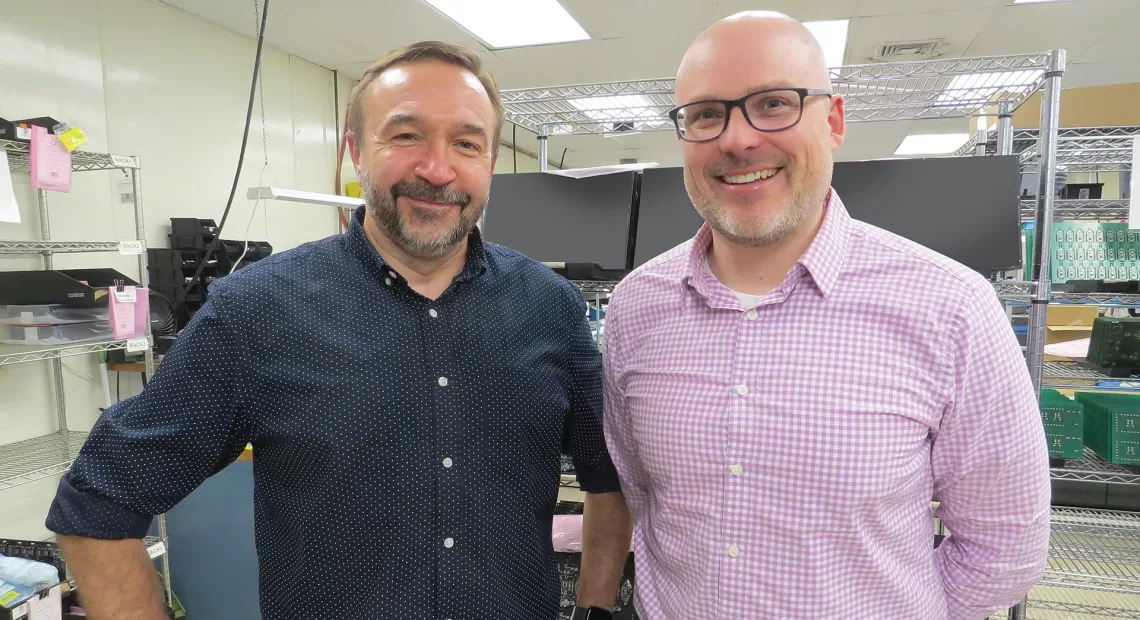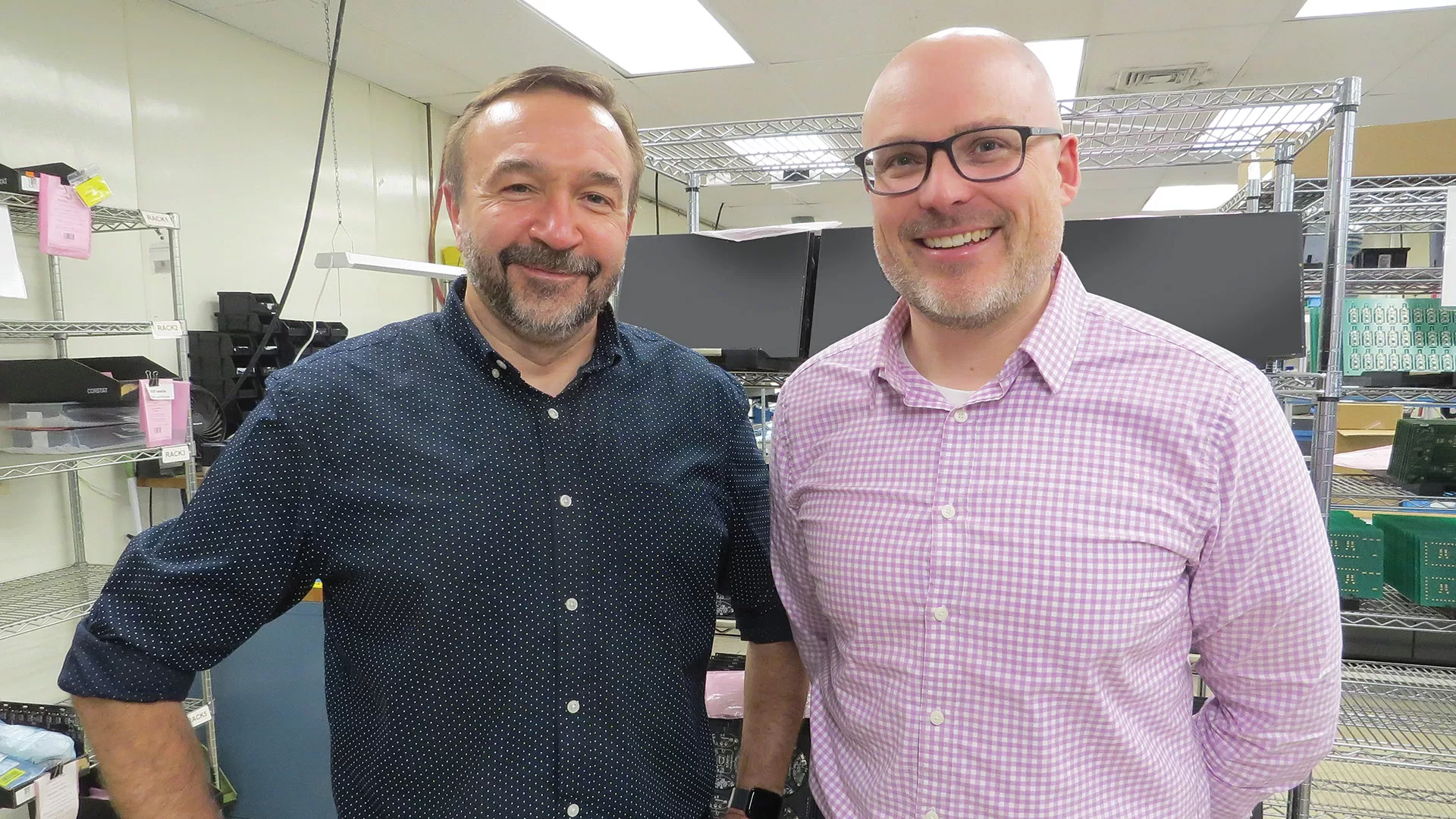
Worthington Assembly Focuses on ‘Humanizing Manufacturing’
Blueprinting a Unique Culture

Rafal Dybacki (left) and Neil Scanlon are focused on continued growth and something they call ‘humanizing manufacturing.’
It’s called “The Pick, Place, Podcast.”
It’s co-produced by Worthington Assembly Inc. (WAi) and a collaborator — and tenant within its space in Deerfield’s industrial park — called CircuitHub, and it’s billed as an electronics show where representatives from the companies, which specialize in circuit-board design and assembly (contract manufacturing), discuss the printed circuit board (PCB) assembly process, offer design tips, and talk to industry guests.
“It’s a unique show — no one else is doing anything quite like this,” WAi principal Neil Scanlon said. “And we have a lot of fun doing it.”
But while proud of their own podcast, Scanlon and Worthington co-owner Rafal Dybacki preferred to talk about a different podcast, called “Uncover the Human,” featuring consultants who talk with guests about … well, how to make the workplace more human.
This has been one of the overriding goals for the two partners since they acquired the company, originally based in Worthington (hence the name) and moved it to Deerfield, and, long story short, they were featured on an episode of “Uncover the Human” just over a year ago.
“It’s a couple of consultants out of Colorado, and they’re trying to find … one way to say it is to peel back the layers and find the good in work and try to make workplaces more human and be not what they are today,” Scanlon said.
“One of our employees is good friends with one of the employees at this consulting company, and they were on a trip together, and our employee was telling her about our culture and how we make decisions. And she kept asking her questions and saying, ‘this doesn’t make any sense,’ and ‘let me try to understand this more.’ She became so fascinated, she said she had to get us on their podcast.”
They told the host what they told BusinessWest — that they take a different approach to hiring and developing employees. It’s an approach hinted at broadly in the headline over the company’s posting on jobsinthevalley.com, which features the two words ‘humanizing manufacturing.’
The two explained what that means.
“We have a flat, decentralized organization,” Scanlon said. “We don’t have supervisors, and everyone works in teams, and the teams work together to deliver quality product to our customers.
“We’re focused on people who are interested in problem solving, learning, and growing,” he went on, adding that part of the team’s culture, as we’ll see, is involving all employees in the work to find people who will make good fits.
Elaborating, Dybacki explained that, after inititial interviews, job candidates will then take what he called a “self-guided tour” of the factory and its various departments, seeing what’s done and asking any questions they might have. By doing this — something that very few, if any, other manufacturers would allow — the applicant gets a sense of not only of the work, but the people he or she will be working alongside.
“We have a flat, decentralized organization. We don’t have supervisors, and everyone works in teams, and the teams work together to deliver quality product to our customers.”
If that candidate is still interested, they begin what Scanlon described as a “three-day working interview,” during which the individual is assigned to work with specific teams. And if they’re still interested, things get taken to the next level — a 30-day working interview.
Overall, this process was blueprinted — there’s that word again — to get the right people on the company’s teams, and a workforce where members are both focused and happy.
For this issue and its focus on Franklin County, BusinessWest talked at length with Scanlon and Dybacki about Worthington Assembly and what’s in their business plan moving forward, but also about humanizing manufacturing and the unique culture they’ve created.
Making It Here
The consultants behind the “Uncover the Human” podcast aren’t the only ones interested in talking with these two entrepreneurs lately.
Indeed, Yvonne Hao, secretary of the state’s Executive Office of Economic Development, got them on the phone late last month as part of a larger effort to assess the climate for small businesses in the Commonwealth, especially those in advanced manufacturing, and better understand their issues and concerns.
Scanlon and Dybacki said they talked about a number of things with her, from the millionaire’s tax and how they feel it penalizes S corporations, like Worthington Assembly, to the gross-receipts tax and how it also it also hamstrings small-business owners. They also talked about the company’s culture, said Dybacki, speculating that Hao may have heard the “Uncover the Human” episode.
Whether she did or not, the call is an indication of how the company and how it operates have gained traction and visibility as it continues to grow and evolve — and mark a half-century of working on the cutting edge of circuit-board contract manufacturing.
Indeed, it was back in 1974 when Tom Quinn, the company’s founder, set up shop in his bedroom and soon developed processes for assembling circuit boards, first for a Boston-based client called Cyborg Inc.
The company moved from Quinn’s bedroom to a small barn in Worthington, where it continued a pattern of steady growth. Quinn and his wife, Barbara, sold the operation to Scanlon and Dybacki in 2008 and, seeking larger quarters, more reliable power, and faster internet, moved it to the industrial park in Deerfield a year later.
There, they’ve continued and enhanced the company’s reputation as a contract manufacturer, amassing a deep portfolio of clients, most of them in New England, in sectors ranging from medical-device manufacturing to industrial controls; from HVAC to segments of the automobile industry.
“We essentially build to a blueprint, much like a machine shop builds to a blueprint,” Scanlon explained. “A customer will come to us with a blueprint, and we will build that product for them precisely as that blueprint states.”
WAi does a considerable amount of work with CircuitHub, a designer of circuit boards for customers around the globe, and ships directly to its clients, Dybacki said.
It is one of the few circuit board assemblers in Western Mass., and a relatively small player in a large and extremely competitive sector, where, in this case, the smaller size is a competitive advantage because it comes with flexibility and the ability to handle the smaller orders that the larger players would not even consider, Scanlon explained.
“We handle things at lower volumes, where it’s too much work to send it off the China because the volume isn’t there, and other competitors simply don’t want to get involved with a $4,000 or $5,000 order,” he said, adding that the company can handle orders of a few dozen of an item to several thousand.
True Grit
WAi has enjoyed steady growth over the past several years, growing its workforce to 35, said Dybacki, adding that the focus has always been on “finding the right person and getting them in the right seat, and making sure they stay here.”
And this is where we return to the company’s culture and that notion of humanizing manufacturing.
Finding the right people is crucial, Scanlon said, because of the custom nature of the work being done.
“We do so many unique assemblies,” he explained. “On a given day, with this team of 35 people, we might be shipping 10 different assemblies that have in some cases never been built by anyone else. In order to do that, you need really good people that have a thorough understanding of how this works.
“You can’t have memorizers, you can’t have button pushers … our people that work here do the same thing over and over again for an hour, and then they move on to something totally different,” he went on. “They need a unique skill set.”
To find the right people — and then keep them — the company has created a comprehensive hiring, training, and onboarding process, one that secures input not only from those doing the interviewing and hiring, but those who will be working alongside the candidate in question.
It begins with that headline over the job placement and accompanying job description — ‘humanizing manufacturing.’
“This catches their eye, and they read about it, and then a lot of times they’ll reach out to us,” Scanlon said. “The type of person you get doesn’t necessarily have the exact skills you’re looking for, but they have the right attitude and a willingness to learn.
Dybacki concurred, adding, “in a lot of cases, that’s more important than having the needed skills.”
That aforementioned process, including the three-day and 30-day working interviews, includes something called a ‘360 form,’ whereby team members are evaluated by colleagues using core values and successful habits. These are listed with accompanying phraseology, so employees know just what they’re looking for, and ‘scores,’ if you will, ranging from ‘excellent’ to ‘average’ to ‘poor.’
These core values and descriptions provide some real insight into the degree to which the company wants people who are good fits, and how everyone at WAi is involved in finding those fits.
Under the core value ‘humility,’ we find “puts the team first; works well with others; open to change; open to learning; check any arrogance at the door; listens to others. No, really listens.”
Under the core value ‘honesty’ (described as “to be candid, straightforward, and fair”) is written, “our ability to be candid with our teammates is essential for our success; we cannot continuously improve if we aren’t talking about opportunities for improvement.”
Other core values and successful habits include ‘have fun,’ ‘contribute,’ ‘work well with everyone,’ and even ‘grit’ — “we need to always stay focused and push through the hard tasks all day, every day without becoming bored or complacent, and take pride in the simple yet at times difficult tasks.”
“Our teammates here will let you know if you have grit, if you’re able to do this work or not,” Scanlon said. “They’ll know just by the sound of the screwdriver.”
Using tools like the 360 form and a rigorous interviewing and onboarding process — which includes listening to that episode of “Uncover the Human” — the company has managed to successfully hire and maintain a workforce when many in manufacturing, and other sectors as well, are struggling to do so.
And much of it comes down to getting everyone at the company involved in this process.
“People here can’t complain about who they’re working with because they helped choose them and they have the ability to put feedback into a person’s 360,” said Scanlon, adding that, overall, these processes have created an environment where everyone is happy with who they’re working with, and they work together to take the company to the next level.
This is a true blueprint for success and a reason why this company is getting some attention — not just for the circuit boards it produces, but for the culture it has created.




